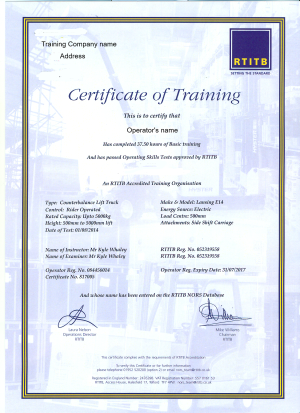Forklift feature articles
The largest forklift operator training website in the world
![]()
![]()
How to check forklift operator qualifications (UK)

According to the Approved Code Of Practice, (L117), forklift operators should receive three stages of training. I won't go through all three stages here but you can download the ACOP here.
The first stage of training is referred to as BASIC TRAINING and consists of a course of both theoretical and practical knowledge. It concludes with tests in three areas.
- A test of practical operating skills
- A test of the candidate's theoretical knowledge
- A test on pre use inspections
At the conclusion of a course like this, candidates are given a certificate which indicates they have received the FIRST stage of training: BASIC training. It is this certificate which indicates that the operator has attended a course and passed the relevant tests to operate a forklift truck. Note that the operator may not be in possession of his/her certificate as the company who paid for the training, (i.e. their old employer), may not have given it to them. They are under no obligation to give the certificates to the operators they pay to have trained although HSE prefers that they do.
(Contrary to popular belief, there is no system of licencing in the United Kingdom and there is no centralised register of forklift operators although RTITB operate their own NORS register).
So a prospective qualified, forklift operator applies for a job and shows a certificate as proof that they have been trained. What next?
According to Laura Nelson from RTITB. “There is no legal requirement to issue certificates but if a certificate is not issued, the individual should provide other evidence of training (a training record and test marking sheets, for example) when applying for jobs.” A copy of any certificate of training should be included in the employee’s records. The first step is to verify whether the certificate itself is authentic.
Who issued the certificate?
Normally the training provider's business name would be on the certificate and a check on line should indicate if they are an authentic training company. Most training providers have a website nowadays so a quick search should enable contact details to be found. Phone the company and ask if they did indeed train the operator. Beware ANY certificate that does not have the trainer's name on it.
Is the training company accredited?
There are five accrediting bodies but some only deal with a specific type of truck such as a telehandler. You can find details of all of them here together with links and information on the Accrediting Bodies Association.
Please note that there is no law that states you must use an accredited company to train your forklift operators. The problem is that, in the event of an accident an employer may be asked to prove that the training given was "adequate" and that is much easier to do if the instructor was employed by an accredited training company.
This means that an employer can, quite legally, use a member of their own staff to carry out the training of their forklift operators but again the The HSE’s ACOP clearly states that “operator training should only be carried out by instructors who themselves have undergone appropriate training in instructional techniques and skills assessment”. It also says that instructors “should give instruction only on the types of lift truck and attachments for which they have been trained and successfully tested as operators”.
What information is included?
The certificate should include particular details such as the dates of training and when the test was passed, as well as the type of machine the operator has been trained on, the rated capacity and lift height. This information is required to establish whether further training is needed before employment. Conversion training will be required, for example, if the machine type detailed on the certificate is different to the equipment used on site, or if there is a significant difference between the load capacity, energy type or attachments.
Has the certificate been altered?
Check whether the document looks like it could have been altered in any way. Perhaps the training dates, or type of equipment listed, could have been altered to fit in with the job requirements.
(I have personal experience of an ex instructor literally selling photocopies of certificates in the pub to a group of Polish workers whose lack of knowledge of English allowed him to get away with it. He subsequently received a jail sentence).
If the operator is on the NORS database which is run by RTITB, they will have a unique number and the validity of their certificates can be verified with one phone call.
Whatever the certificate says, it is important to assess an operator before authorising them to operate equipment on site. Specific job training (including controls and fuel type) should be completed for the truck they will be required to operate and familiarisation training, (supervised operation on site), will get the operators used to the site protocols and the loads being handled
My thanks to Laura Nelson, boss of RTITB for some of the content in this article which has been taken from an older article of Laura's.